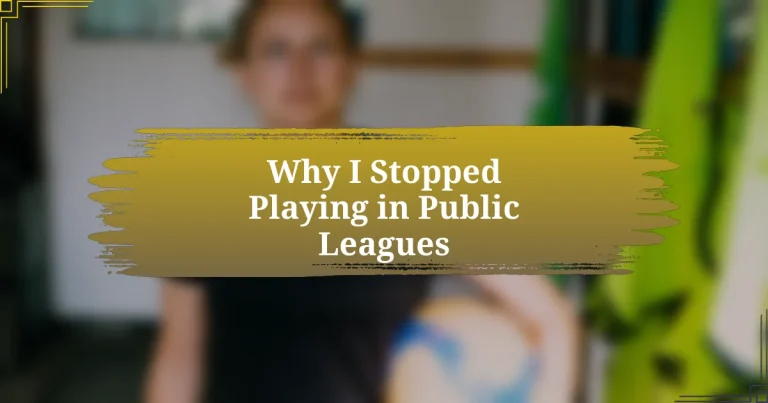Key takeaways:
- Public leagues often face challenges such as varying skill levels, lack of engagement, and unpredictability of player participation, which can diminish the competitive experience.
- Unsportsmanlike behavior and abandonment of teams by other managers can lead to frustration and a reconsideration of participating in public leagues.
- Exploring alternative formats like salary cap leagues, dynasty leagues, and best ball leagues can enhance enjoyment and introduce new strategic elements to fantasy football.
- Camaraderie and shared experiences are crucial for a fulfilling fantasy football experience, often lacking in larger public leagues.
Author: Emma Hartley
Bio: Emma Hartley is an accomplished author known for her compelling narratives that explore the complexities of human relationships and societal themes. With a background in psychology and literature, her work often fuses emotional depth with sharp wit, captivating readers around the world. Emma’s novels have earned critical acclaim and numerous awards, solidifying her place in contemporary fiction. When she’s not writing, she enjoys hiking and volunteering with local literacy programs. Emma resides in Seattle with her two rescue dogs, and she is currently working on her next novel.
Common challenges in public leagues
One common challenge I faced in public leagues was the sheer variation in skill levels among the participants. It’s frustrating to put in hours of research and strategy only to find that some players are simply not as invested. Have you ever noticed how one or two members might not even set their lineup each week? It can render the entire competitive aspect nearly obsolete.
Another hurdle is the unpredictability of player participation. I remember a season where I heavily invested in a team member who was consistently injured, yet a few public league friends seemed oblivious to such risks, still drafting the same high-profile players without consideration for their health. This lack of diligence can feel like an uphill battle, especially when you’re trying to play smart and build long-term success.
Lastly, the frequent trade and waiver claims can be a double-edged sword. While it’s exciting to make moves and adapt, I once found myself in a bidding war over a backup running back that everyone seemed to want. It left me wondering: is it really worth the chaos? The constant jockeying for players often leads to disappointment and can overshadow the fun of simply enjoying the game.
Reasons for leaving public leagues
Participation in public leagues can quickly become overwhelming. During my last season, I experienced rampant trolling and unsportsmanlike conduct from certain league members. It was disheartening to watch the camaraderie that usually shines in fantasy football get overshadowed by petty jabs and immature behavior. Have you ever felt that the competitive spirit has crossed the line into negativity? It certainly made me reconsider whether I wanted to invest more time in such environments.
Another issue that consistently surfaced was the lack of engagement from many owners. I distinctly remember joining a public league with high hopes, only to encounter a manager who abandoned their team midway through the season. Seeing my carefully crafted strategy thwarted by a league member who no longer cared was incredibly frustrating. It made me question the purpose of my commitment when others weren’t reciprocating.
Finally, the constant influx of new players into public leagues can lead to a chaotic atmosphere. With each new season, you never know if you’ll face a group of dedicated competitors or a mix of casual players. I once participated in a league that felt more like a free-for-all, where people were drafting players as if they were picking names from a hat. It left me yearning for a more predictably competitive environment, which is ultimately why I sought refuge in private leagues.
Finding alternative fantasy football formats
Finding alternative fantasy football formats has become an essential part of my quest for a more enjoyable experience. I remember the excitement of trying a salary cap league for the first time; it added a whole new layer of strategy to the game. Instead of just drafting players, I had to think about budgeting and value, making each decision feel significant and rewarding. How refreshing it was to engage differently, focusing on the player’s worth rather than just their stats!
Another format that captured my interest is the dynasty league. The notion of maintaining a roster over multiple seasons really appealed to me. It felt more like managing a real NFL team, where long-term planning became crucial. I vividly recall trading for a rookie player and waiting eagerly for his development to pay off. There’s something uniquely gratifying in watching that kind of strategic investment flourish over time.
I’ve also explored best ball leagues, which eliminate the stress of setting lineups each week. It’s such a relief to simply draft and let the algorithm choose the best performing players automatically! The thrill of seeing how my draft choices panned out week after week, without additional effort, was both exhilarating and liberating. Have you ever wished for a way to enjoy fantasy football without the weekly grind? Best ball leagues provided that perfect escape for me, allowing me to enjoy the game without feeling overwhelmed.
Personal reflections on league experiences
Reflecting on my time in public leagues, I often recall the early days when the excitement was palpable. The sheer anticipation of the draft felt electric, but as the season unfolded, I encountered challenges that gradually dimmed that thrill. The unpredictability of opponent behavior left me frustrated; one week you’re on top, and the next, your rivals make a few genius moves that suddenly put you in a precarious position.
There was a season where I finished last in a public league, and honestly, it stung more than I expected. I had invested time, researched players, and crafted my ideal roster, only to watch it crumble against random trades and questionable pickups by others. That moment forced me to question the enjoyment I was getting from the competition. Why was I putting in so much effort when it felt like chaos was the only constant?
Over time, I realized that the camaraderie often found in smaller leagues was missing in public formats. I remember a particularly brutal loss, which would have been a great story to share with friends in a more intimate setting. Instead, I was left alone with my thoughts, reflecting on a pivotal lesson: sharing the ups and downs of the game makes it far more rewarding. It’s those connections that keep the spirit of fantasy football alive, don’t you think?














